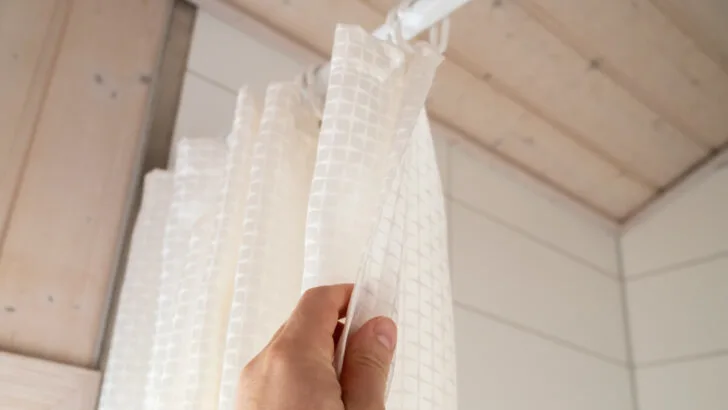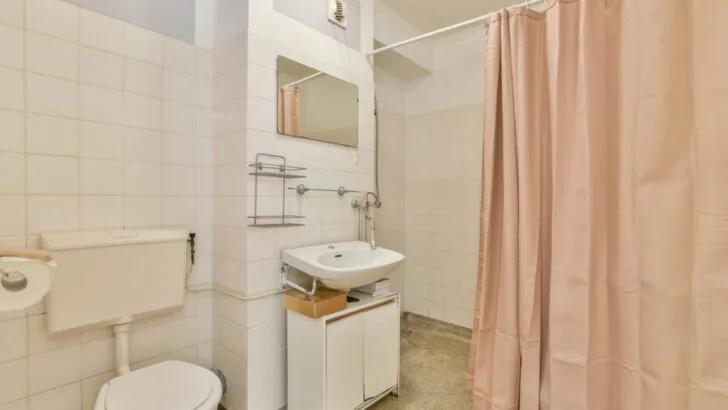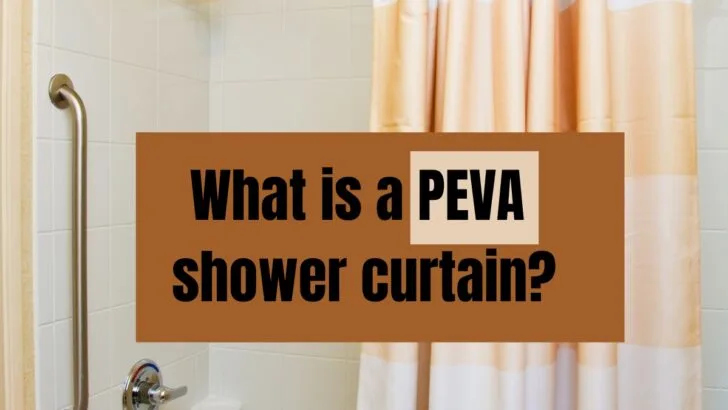Although the purchase of a shower curtain is a pretty straightforward task, the variety of options available in the market can make it a bit confusing, especially when you discovered that there are newer options such as PEVA shower curtains now available in the market.
Despite the fact that many consumers have yet to notice, PEVA shower curtains have grown in popularity over the past several years. But what exactly is a PEVA shower curtain?
PEVA shower curtains, which is an abbreviation of Polyethylene Vinyl Acetate, is a non-chlorinated vinyl that usually replaces PVC, a form of chlorinated vinyl. Many home goods, including shower curtains, are made of this widely popular substance.
It is even used to make several items in your home such as shoes, stickers, toys, makeup bags or coverings for cars, tables, and mattresses.
Is PEVA a Good Material for Shower Curtains?
Polyethylene Vinyl Acetate is a substance that is frequently used to create shower curtain liners and is said to be safer for the environment and less harmful than PVC ones.
The chemical synthesis of PEVA is done using a number of different components and is commonly seen as safe to handle at home. It was developed as a less harmful alternative to PVC (polyvinyl chloride) products, which were more widely used before PEVA was introduced.
Here are three major features of PEVA shower curtains that make them ideal for shower curtains:
Water-Resistant
These shower curtains are ideal to ensure water stays in your shower, and it also prevents water damage around the floor of your tub. This also makes it easy to wash in the washing machine, provided you follow specific instructions for doing so.
No Residual Chemicals
PEVA curtains also ensure that no residual chemicals remain to evaporate and inhale when you use it, making it a safer alternative to other chemically-produced products.
Affordable But Sturdy
PEVA is cheap to manufacture and extremely durable. It will last for quite a long time and can also be recycled once the curtain is no longer in use.
Is PEVA Fabric or Plastic?
By using PEVA curtains, users can be shielded from the hazardous off-gassing that shower curtain liners made of PVC carry. So, PEVA material feels more like plastic than cloth because it closely mimics the texture of vinyl shower curtain liners.
Is PEVA Eco-Friendly?
PEVA is a very eco-friendly material. In contrast to the majority of other plastics, including PVC, PEVA may be easily broken into smaller parts. This not only makes PEVA a biodegradable material, but also enables full recycling of it.

The majority of plastic recycling centers are genuinely happy to accept your used PEVA goods. When you no longer require a certain PEVA product, you can easily give it to a recycling center where it will be broken and turned into components that can be used to make a whole new product.
Most PEVA goods have an excellent lifespan and are known to be quite robust, making them a superb option when you want a long-lasting product in addition to being very advantageous for the environment.
This has caused many PEVA textile manufacturers to create goods suited for outdoor use, as the toughness of the material can even endure outside weather.
If you plan on buying a PEVA shower curtain, you can expect it to last long and can be recycled once you are done using it.
Is PEVA Safe?
Unlike the harmful material used in PVC, PEVA is completely free of chloride and is a safer alternative. Although they are both varieties of vinyl plastic, the amount of dangerous chemicals present in each one varies substantially.
Since PVC itself contains phthalates, a recognized carcinogen and highly hazardous chemical, PEVA is substantially safer than any PVC product as it is entirely devoid of phthalates.
PEVA is frequently used for sandwiches and lunch bags and is regarded as reusable, making PEVA a totally risk-free choice that doesn’t contaminate your food in storage.
Further, due to the absence of chlorine, PEVA is also seen to be a much safer alternative than many other forms of polymers. It has been proven that because of this apparent lack of chlorine, PEVA products do not release any hazardous fumes.
However, PEVA products lack the green earth mark present on many plastic products, indicating that they are not a proven environmentally friendly alternative, as they contain compounds that have not yet undergone thorough testing.
Moreover, even though PEVA is generally recognized as a far safer substitute for PVC, it still contains significant amounts of chemicals. Other pollutants in PEVA may also exist that have not yet been researched but may be hazardous to the majority of human bodies.
Hence, given the limited amount of studies on PEVA, it is advised against exposing young children or newborns to it.
What Is the Best Material for a Shower Curtain?
Shower curtains can be found in a range of materials, such as cotton, vinyl, polyester, and microfibre. All of these materials have their pros and cons, but the question regarding which one is the best gets clear when we discuss these materials in detail.

- Vinyl shower curtains are a popular choice when compared to textile alternatives, as they are affordable and easy to maintain. These curtains are easy to care for, available in a variety of colors and patterns, and go well with bathroom decor. Vinyl naturally repels water, which makes it less likely for hazardous mould and mildew to flourish.
- Polyester shower curtains are a water-resistant alternative to vinyl. Even though most curtains are water-resistant, it’s always a good idea to read the label. Polyester, often known as microfibre, is exceptionally strong, resilient, and simple to wash by hand or in a machine. Shower curtains made of polyester, as opposed to vinyl curtains, will look more like fabric and be heavier.
- Although they can cost extra, cotton shower curtains are typically a decent option. Cotton curtains must be washed every month yet are the most durable and easy to wash. The fabric and appearance of cotton shower curtains can give your bathroom a more opulent vibe. Cotton absorbs moisture easily, so, if you do buy a cotton curtain, remember to get a quality liner to go with it.
Considering these factors, polyester shower curtains sit right between the three materials in terms of cost, quality and maintenance. Hence, polyester shower curtains may be the most value-for-money option and can be considered the best material for a shower curtain. However, vinyl and cotton do have an upper hand against polyester in some areas and can be considered if they fit in your bathroom design.
Final Words on PEVA Shower Curtains
To sum it up, curtains made of PEVA are an improvement over typical vinyl ones. PEVA shower curtains are safer since they have lower levels of volatile organic compounds.
They are efficient for their price even though they may not be as fashionable as cloth curtains. Furthermore, polyester is also used to make shower curtains and is incredibly resilient and simple to wash. It also has a fabric-type texture making it a good alternative to PEVA shower curtains.


